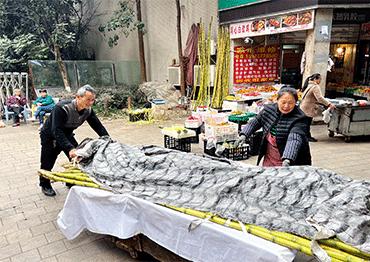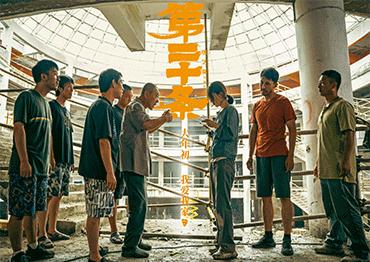Zhang Yimou’s latest film draws the spotlight on self-defense cases in China, where after decades of conservative rulings, a mix of public outcry and new criminal law guidelines has led to a surge in acquittals for defendants long seeking justice

On the night of August 15, 2020, 52-year-old Hou Changhong of Chongqing knelt on Zhang Yong’s chest while holding a knife to his neck.
As another man wrestled for the weapon, Hou’s wife, Xiao Yongfen, heard the commotion from their nearby apartment. She immediately rushed to the scene, their crying 6-year-old daughter in tow.
With his wife in sight, Hou loosened his grip and handed the knife to her. He was taken away by police a few moments later.
The following year, Hou was sentenced to two years in jail for the incident, which had resulted in two men being seriously injured and one slightly wounded. However, he was released six months later with compensation when Chongqing’s Jiulongpo District prosecutors withdrew the lawsuit on the grounds of justifiable self-defense.
Hou is among 77 defendants who were acquitted for self-defense between 2021 and 2023, according to the annual report of the Supreme People’s Court delivered on March 8 during this year’s two sessions.
The decisions were handed down in part due to new judicial guidelines released this year on interpreting the Criminal Law’s Article 20, which defines justifiable self-defense.
Article 20 states that if someone uses force to stop illegal activities like kidnapping, murder, and robbery that threaten the safety of others, it can be considered justified even if it results in death. In such extreme cases, the punishments for the person defending themselves should be reduced, or eliminated altogether.
Though technically law for decades, the article’s ambiguity led many judges to err on the side of caution, resulting in rulings that predominantly deem the person responsible for causing harm as being in the wrong.
“Judicial officials would base their judgments on previous cases where injuries, deaths, and the escalation of violence could turn a legitimate act of self-defense into a criminal assault,” Wang Yong, the deputy procurator general from Suzhou, Jiangsu Province, told the Procuratorate Daily in February.
In recent years, several prominent self-defense cases have become focal points of public discourse. This attention culminated in the Zhang Yimou-directed Article 20.
Released on February 10, the film raked in over 2 billion yuan (US$280m) in its first two weeks. It intertwines three parallel story lines that revolve around self-defense and issues such as sexual assault, bullying, and vigilantism, and the legal battles for social justice faced by marginalized individuals like Hou.
The Incident
Born to a rural family, Hou made a living selling fruit to Chongqing’s urban residents. In 2009, he and his first wife rented a small shop in a residential community in the city’s Jiulongpo District. For the next three years, life remained fairly uneventful for him – until tragedy struck.
One night while out getting dinner, Hou Jie, his only son, was stabbed and killed in a fight. While still grieving their loss, Hou’s first wife passed away from a serious illness that was exacerbated by their son’s death, Hou told NewsChina.
In 2013, Hou married Xiao, and they had a daughter the following year. Their fruit shop did brisk business and Hou once again found peace, he said.
But on August 15, 2020, after Xiao took their daughter home for bed, around six men approached Hou’s shop at 10 pm.
The group included Zhang Yong, as well as three others named in the case – Liang Long, Wan Kai, and Tang Qiang. They had all been drinking, court documents said.
The conflict began when Liang ate a handful of plums without paying. Hou protested. But before he could say much, another man among them shouted that they had more than enough money to cover the cost, a witness told Chongqing TV’s news show Daily 360.
To prove the claim, Liang asked Hou to weigh some grapes. They cost 2.9 yuan (US$0.4), for which Liang rounded up and paid 3 yuan (US$0.41).
However, instead of eating them, they stood there and intentionally threw the grapes on the ground one after another, Hou told NewsChina.
With the men still lingering, Hou said he did not want to escalate the situation and retreated to a rattan chair inside his shop. Almost immediately, the men forcefully pulled him up, slapped him around, and attacked him with a plastic stool. The men then left, but not for long.
Liang, Zhang, and Tang, who had not gone far from the shop, soon returned and continued to harass Hou. They overturned his fruit baskets before kicking and striking Hou once again with the stool. Hou said they were accusing him of insulting them behind their backs.
Concerned about the potential impact on his business, Hou said he chose not to involve the police. He instead began putting fruit away to close up.
“I was holding a knife to cut watermelons that weighed about 15 kilograms each because they were too big to put into the fridge,” Hou told NewsChina.
It was at this moment that Liang charged toward him. Knife in hand, Hou slashed at Liang, cutting him.
“When I saw Liang running at me, I waved the knife to scare him off without intending to knock him down,” Hou said.
After seeing Liang fall to the ground, Zhang and Tang rushed Hou. Still holding the knife, Hou threw Zhang down and held him there, knife pressed to his throat. Tang jumped on Hou’s back to get the knife from him, the fruit seller said. It was at this moment that Xiao arrived. It was not reported who notified the police.

After being jailed for 502 days, Hou Changhong, a middle-age fruit peddler in Chongqing, was released after his verdict was quashed, and gets back to running his business with his wife Xiao Yongfen, who fought for him to be released, March 2024 (Photo by Liu Xiangnan)
Charges Dropped
When attorney Zhai Qingting first met with a detained Hou three days after the incident, he recognized it as a case of self-defense. He attempted to get Hou out on bail, which was denied in late August 2020 in light of the injuries that Zhang, Tang, and Liang sustained.
With Hou in custody, Xiao had to manage their fruit shop by herself, from restocking at dawn to closing at night. Caring for three elderly family members and a young daughter at home while also struggling to cover expenses was taking a toll on Xiao. But she soon took action.
In a bid for Hou’s release, Xiao submitted a petition to the court signed by their neighbors stating that he acted in self-defense. She also contacted the families of the injured men, offering a total compensation of 200,000 yuan (US$27,660). However, she gave up on the idea when the families demanded a minimum combined sum of 700,000 yuan (US$96,810).
Zhai told NewsChina that local authorities also attempted to persuade Hou to compensate the injured men. “They told Hou if he paid the injured men, he would be released immediately,” Zhai said. However, feeling unjustly treated, Hou refused. During their 12 meetings leading up to the trial, Hou insisted that Zhai advocate for his innocence.
Hou stood trial on May 26, 2021, nearly nine months after the incident. Following eight hours of deliberation, he was convicted by judges and handed a verdict of two years behind bars.
According to court records, prosecutors in the case argued that despite the confrontational situation Hou faced, he should not have resorted to using a knife in response. Given that the other men had not posed an immediate threat to his life, Hou could have chosen to contact the police instead, prosecutors said.
Six months had passed when Zhai received a call from the court. Hou had been acquitted on the grounds of self-defense, and was on the verge of being released.
Playing a significant role in the decision was a collection of judicial guidelines for self-defense cases released in September 2020 while Hou was in jail. Issued by the Supreme People's Court, the Supreme People’s Procuratorate, and the Ministry of Public Security, the guidelines emphasized the need for courts at all levels to exercise caution when imposing penalties on cases involving “excessive self-defense” (serious injury or death). The aim was to ensure that the defendants’ actions were not motivated by extreme fear, nervousness, or retribution, and that the harm caused was proportionate to the crime.
“The guidelines made the application of justifiable self-defense more flexible compared to previous cases where most defendants were sentenced for intentional assaults,” Zhai said. He highlighted that Hou’s psychological state, which was influenced by the tragic stabbing of his son, should be taken into account when evaluating his use of the knife.
On March 28, 2022, Jiulongpo District prosecutors announced the State would compensate Hou a total of 187,296 yuan (US$24,160) for his 502-day incarceration, as well as an additional 13,000 yuan (US$1,670) for pain and suffering.
Prior to the announcement, Liang, Zhang, and Tang filed a civil lawsuit seeking compensation totaling almost 430,000 (US$59,380). However, as the prosecution had dropped charges against Hou, the claim was nullified.
Following Hou’s release, the judge asked him and Xiao whether they intended to counter sue for any losses to their business. The couple declined, saying they had already forgiven the men and hoped they would learn from their actions.
But Liang refused to give up. On April 26, 2023, Jiulongpo District Court dismissed Liang’s compensation lawsuit against Hou. According to the verdict, Hou was absolved from any compensation due to justifiable self-defense. Liang appealed to No. 5 Chongqing Intermediate People’s Court, which upheld the ruling.
Liang did not respond to interview requests from NewsChina.

A poster for the latest Zhang Yimou-directed movie, Article 20. Released on February 10, the film drew attention to miscarriages of justice when people had been convicted of crimes, even if they had acted in self-defense
Public Awareness
Justifiable self-defense was first introduced to China’s Criminal Law in 1979 under Article 17. However, it was deemed too broad and left too much discretion to judges, many of whom avoided exercising it altogether. Though an amendment in 1997 under Article 20 added greater definition to self-defense, it had an undesired effect.
“In the years that followed, the judicial system was reluctant to apply the law of justifiable self-defense, all while imposing penalties on too many cases involving excessive self-defense, sometimes even penalizing those who engaged in a conflict to rescue others,” Wang Shuai, dean of the Minzu University of China law school, told newspaper Democracy and Law Times in 2019.
The complexities of differentiating self-defense from assault, as well as the difficulties of evidence collection, hindered the adoption of Article 20 until a spate of high-profile cases added pressure from the public. ���
One of them occurred in December 2018, when Zhao Yu, a migrant worker in Fuzhou, Fujian Province, was detained by police after stopping an attack on his female neighbor in her apartment by a male intruder.
Zhao, who lived upstairs, said he heard the commotion through the floor. He rushed in and kicked the man, seriously injuring him. After 13 days in custody, he was released on bail and faced charges of criminal negligence. He was later acquitted on the grounds of justifiable self-defense.
In August that same year, Yu Haiming was riding a bike in Kunshan, Jiangsu Province when he was nearly hit by a driver, Liu Hailong. Police later determined that Liu had been intoxicated.
After Yu confronted him, Liu pulled a machete from his vehicle and slashed at Yu, but then accidentally fumbled it. Yu snatched up the weapon from Liu and struck him multiple times, then continued to swing at Liu as he retreated.
Police took them to the hospital, where Liu died from multiple stab wounds. Judges deemed that Yu had acted in self-defense, and Yu’s continued aggression was to prevent Liu from attacking him further.
Both cases sparked significant public outcry that ultimately resulted in the exoneration of the defendants based on Article 20. Legal experts attributed increased public awareness of rule of law and the evolving capabilities of judicial institutions as primary reasons for the courts citing the article.
According to the latest Supreme People’s Procuratorate annual work report, 261 people in 2023 were exonerated from prosecution for justifiable self-defense, marking a 25.5 percent increase year-on-year.
This change is embodied in Zhang Yimou’s Article 20 through prosecutor Han Ming, played by A-list actor Lei Jiayin, and his courageous defense of an underprivileged rural family in a lawsuit.
The film emphasized the crucial role of justifiable self-defense in safeguarding the rights of marginalized groups.
“If justice and fairness come at a cost, then who should bear that burden? Should it be the powerless, their families or their future generations? If their cries for justice go unheard, then what is the purpose of a prosecutor?” protagonist Han Ming says in the film.
Article 20 reignited longstanding debates over how such laws are interpreted and who benefits most from them.
Luo Xiang, a professor at the China University of Political Science and Law, called for more empathy from the legal community when evaluating selfdefense cases. “We must put ourselves in the defendant’s shoes to understand their feelings and pain,” Luo said during a February 12 livestream on video platform Bilibili.
However, some criticized the film’s happy ending, saying it glossed over the harsh reality that social justice is a luxury for the vulnerable.
“The justice achieved at the end is actually more of a victory for prosecutors and police than the real victims who may still face harassment even though they won. If one cannot afford the cost of pursuing justice, they’d better give it up,” Hui Hui, who identifies as a lawyer in Hubei Province, posted to Quora-like site Zhihu on February 16.
But a commenter from Henan Province condemned the lawyer’s take: “Do the vulnerable not pay a price when they compromise? If everyone puts up with unfairness out of fear of paying a price, how incorrigible will society become?”

 Old Version
Old Version


